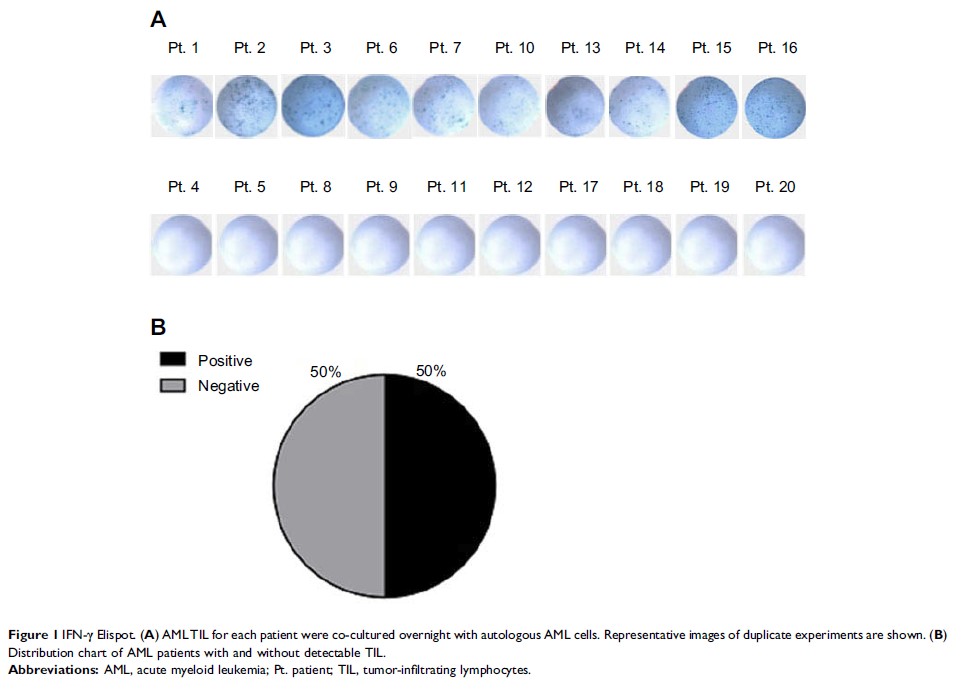9 0 9 6 8
论文已发表
注册即可获取德孚的最新动态
IF 收录期刊
- 2.6 Breast Cancer (Dove Med Press)
- 3.9 Clin Epidemiol
- 3.3 Cancer Manag Res
- 3.9 Infect Drug Resist
- 3.6 Clin Interv Aging
- 4.8 Drug Des Dev Ther
- 2.8 Int J Chronic Obstr
- 8.0 Int J Nanomed
- 2.3 Int J Women's Health
- 3.2 Neuropsych Dis Treat
- 4.0 OncoTargets Ther
- 2.2 Patient Prefer Adher
- 2.8 Ther Clin Risk Manag
- 2.7 J Pain Res
- 3.3 Diabet Metab Synd Ob
- 4.3 Psychol Res Behav Ma
- 3.4 Nat Sci Sleep
- 1.9 Pharmgenomics Pers Med
- 3.5 Risk Manag Healthc Policy
- 4.5 J Inflamm Res
- 2.3 Int J Gen Med
- 4.1 J Hepatocell Carcinoma
- 3.2 J Asthma Allergy
- 2.3 Clin Cosmet Investig Dermatol
- 3.3 J Multidiscip Healthc

对急性髓性白血病患者肿瘤浸润淋巴细胞的存在和抗肿瘤潜力的评估
Authors Wei L, Wang Z, Zhang Z, Li Y, Fan S, Zhao Y, Liu Z, Ye X, Zhang F, Yu Y, Liu X, Cao F, Zhou J
Received 29 December 2018
Accepted for publication 18 March 2019
Published 12 April 2019 Volume 2019:11 Pages 3187—3196
DOI https://doi.org/10.2147/CMAR.S199817
Checked for plagiarism Yes
Review by Single-blind
Peer reviewers approved by Dr Andrew Yee
Peer reviewer comments 2
Editor who approved publication: Dr Alexandra Fernandes
Purpose: Assessing
the possibility of finding tumor-infiltrating lymphocytes (TIL) in bone marrow
of acute myeloid leukemia (AML) patients and evaluating the anti-tumor activity
of these TIL against autologous AML cells.
Patients and methods: TIL were
immunomagnetically isolated by using anti-CD3 from bone marrow samples of 20
patients at the presentation of AML or four weeks upon completion of
chemotherapy. TIL were ex vivo expanded for two weeks and immunophenotyped.
Functionality in terms of cytokine secretion and cytotoxicity was assessed by
γ-interferon quantitation and Elispot assay, respectively.
Results: TIL were
detected in bone marrow samples of 50% (10/20) of the patient cohort. They were
noted to highly express CD137 and PD-1 and display a significantly higher
anti-tumor reactivity compared to that of autologous peripheral blood
lymphocytes. TIL could be expanded in co-cultures with irradiated feeder cells
supplemented with interleukin (IL)-7 and IL-15.
Conclusion: Data
suggested the presence of reactive γ-interferon-secreting TIL in AML patients.
They are expandable and possess anti-tumor activity, which might have a great
potential in the development of adoptive cellular therapy for AML.
Keywords: tumor-infiltrating
lymphocytes, acute myeloid leukemia, adoptive cell therapy, immunotherapy
